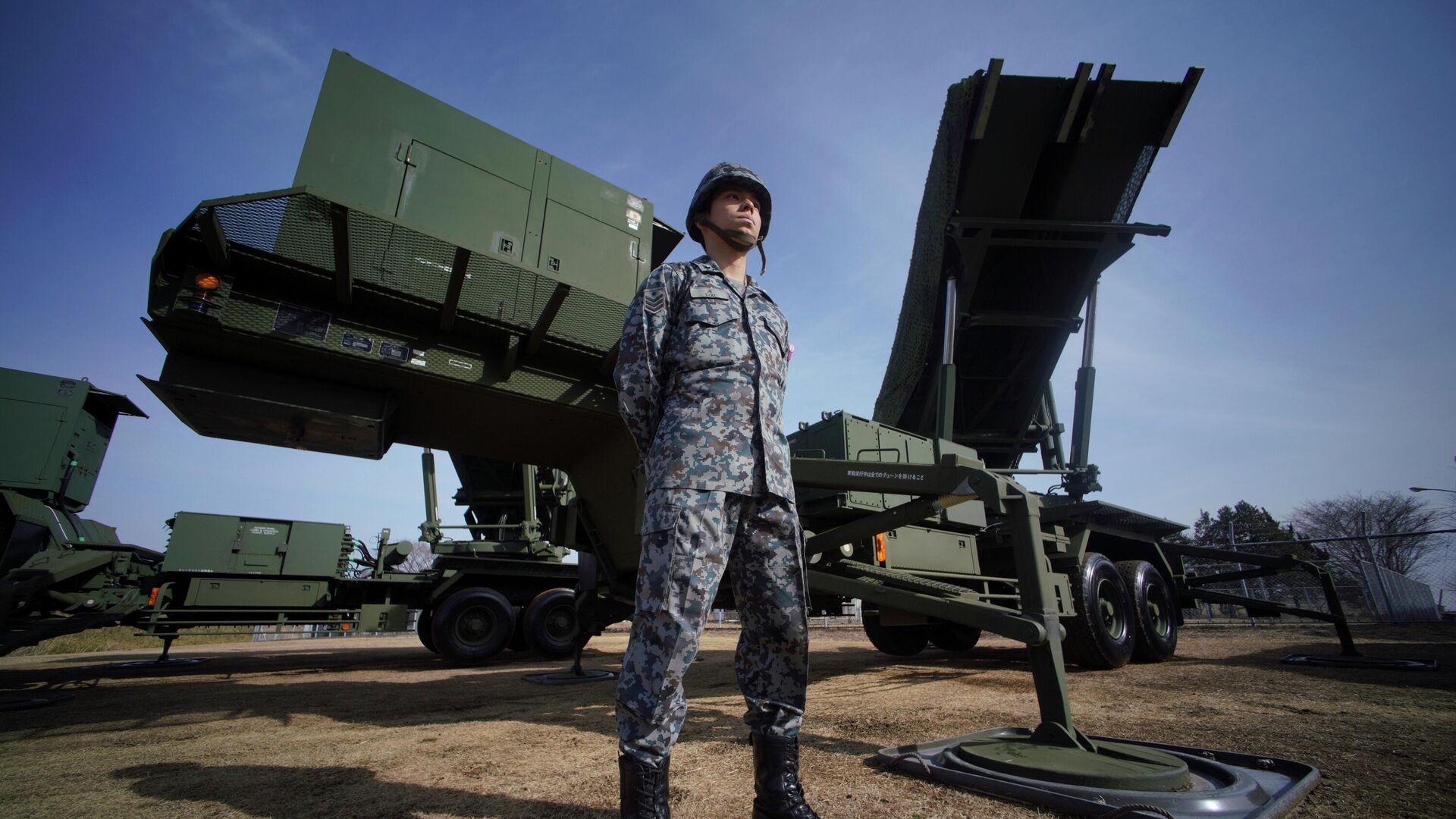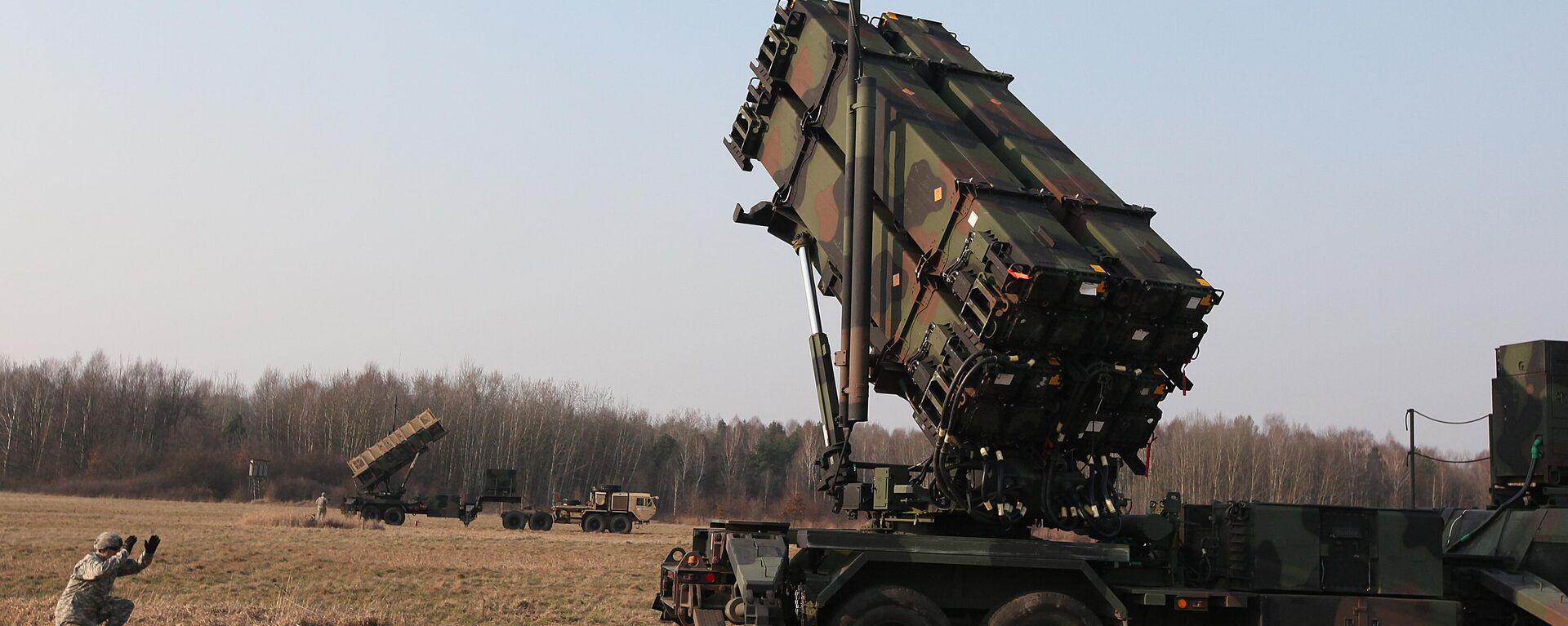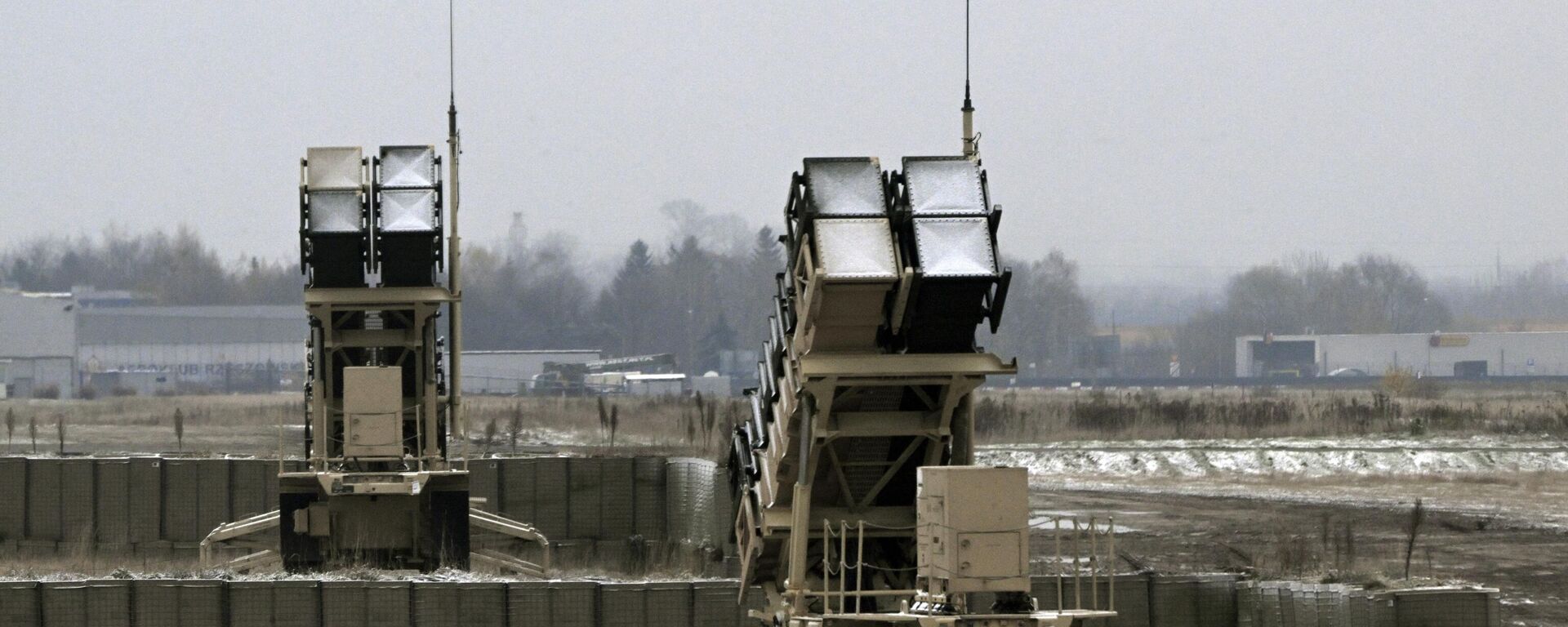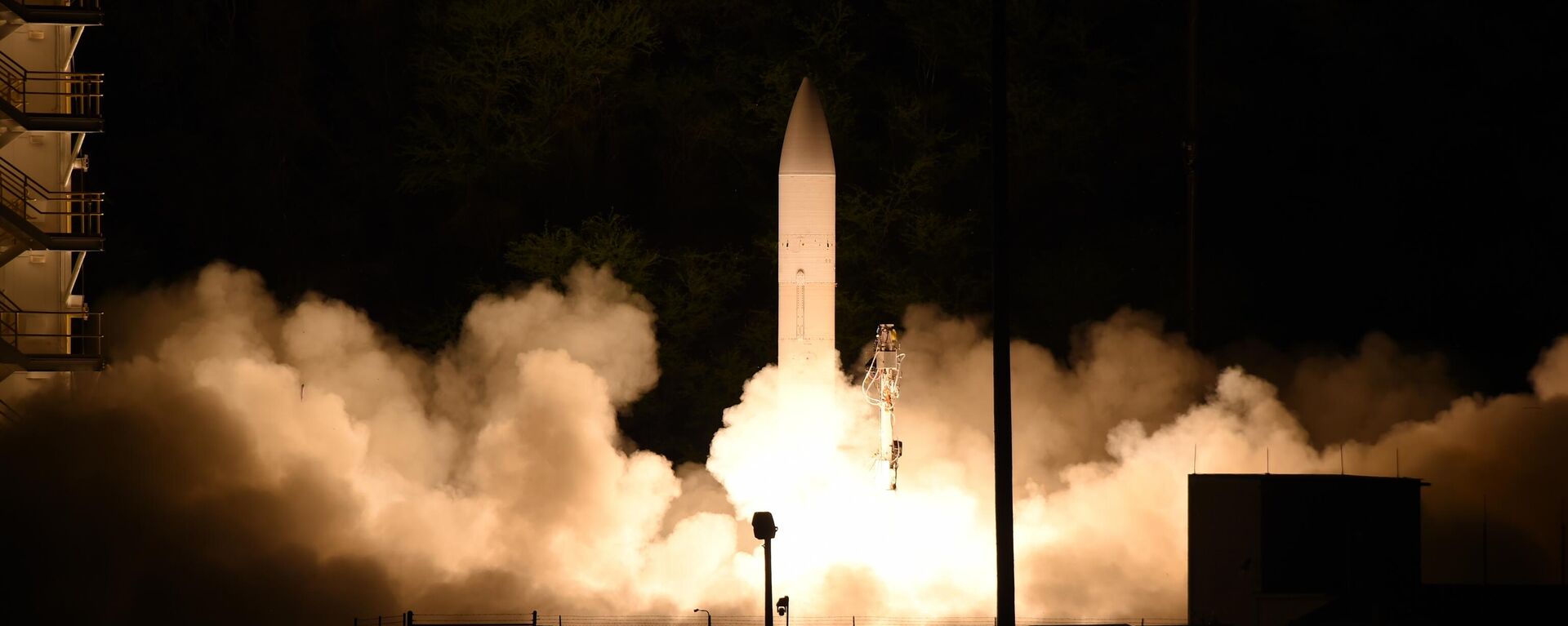https://sputnikglobe.com/20240720/boeing-strikes-again-disrupting-japanese-patriot-production-and-impacting-us-credibility-1119445503.html
Boeing Strikes Again, Disrupting Japanese Patriot Production and ‘Impacting US Credibility’
Boeing Strikes Again, Disrupting Japanese Patriot Production and ‘Impacting US Credibility’
Sputnik International
Sources have told US media that shortages of a key component made by Boeing that goes into Patriot PAC-3 missiles threatens to unravel US’ push to boost the missile system’s production in Japan.
2024-07-20T19:22+0000
2024-07-20T19:22+0000
2024-07-20T19:22+0000
military
earl rasmussen
military & intelligence
us
joe biden
japan
washington
ukraine
mitsubishi heavy industries
us army
https://cdn1.img.sputnikglobe.com/img/07e6/07/09/1097140223_0:0:3000:1688_1920x0_80_0_0_b16893cd00e42675cdb36e209706e95f.jpg
In December 2023, the Japanese government announced it would fulfill Washington’s request to export its license-built Patriot PAC-3 interceptor missiles to the United States.Mitsubishi Heavy Industries – the only defense contractor outside the US that makes Patriots, has been manufacturing small numbers of Patriot missiles for years for use by Japan’s Self-Defense Forces, with production normally averaging about 30 PAC-3 missiles a year. Government officials say output could be doubled.But plans to increase production have reportedly hit a snag thanks to shortages of seekers for the missiles – with the critical component made by Boeing.“It could take several years before Mitsubishi Heavy Industries is able to raise output” thanks to the shortage, an industry source told Reuters in a report published Saturday.Boeing began expanding the factory that makes the Patriot seekers in 2023, but the expected 30 percent increase in production capability won’t be achievable until 2027.“This impacts US credibility,” Lt. Col. (ret.) Earl Rasmussen, a 20 year+ veteran of the US Army-turned international consultant, told Sputnik, commenting on the seeker snag.The Boeing seeker head “bottleneck” is “a very critical, perhaps one of the most crucial elements of the Patriot system,” the veteran defense observer explained, noting that it’s this component that allows the Patriot’s PAC-3 missiles to acquire their targets and guide them to those targets.Rasmussen predicts that after seeing the US renege on its commitments to deliver already ordered Patriots, now combined with the monkey wrench inadvertently thrown into the missiles’ production cycle by Boeing, America’s partners “will most likely look not just at how [Patriots] are performing, but potentially will look at other solutions to their defense needs as well,” leaving Boeing, Raytheon and Lockheed Martin out of a contract.As for the Patriot missile factory in Japan, it “only produces 30 and its max capacity is 60. So again, in order to increase production beyond that, if you can get the seeker heads delivered, which is another story, they'll have to build an entire new facility, which would take years as well,” Rasmussen said.Washington plans to increase PAC-3 production capacity from about 500 a year today to about 750 a year in the near future. Lockheed, the system’s primary contractor, plans to increase the manufacture of its $4 million apiece interceptors from 500 to 650 by 2027.A US defense official told Reuters a $4.5 billion contract had been signed with the US army in June to increase Patriot production.President Biden and Japan’s Prime Minister, Fumio Kishida, announced plans to strengthen US-Japanese defense cooperation this past spring.
https://sputnikglobe.com/20240711/us-sending-to-ukraine-older-patriot-battery-valued-at-100mln---pentagon-1119343805.html
https://sputnikglobe.com/20240709/biden-says-us-european-allies-to-provide-ukraine-with-dozens-of-new-air-defense-systems-1119319468.html
https://sputnikglobe.com/20240516/playing-catch-up-us-japan-ink-deal-to-co-create-hypersonic-weapon-interceptor-1118468905.html
japan
washington
ukraine
Sputnik International
feedback@sputniknews.com
+74956456601
MIA „Rossiya Segodnya“
2024
News
en_EN
Sputnik International
feedback@sputniknews.com
+74956456601
MIA „Rossiya Segodnya“
Sputnik International
feedback@sputniknews.com
+74956456601
MIA „Rossiya Segodnya“
does japan make patriot missiles, how much do patriot missiles cost, are patriot missiles good, who makes patriot missiles
does japan make patriot missiles, how much do patriot missiles cost, are patriot missiles good, who makes patriot missiles
Boeing Strikes Again, Disrupting Japanese Patriot Production and ‘Impacting US Credibility’
Sources have told US media that shortages of a key component made by Boeing that goes into Patriot PAC-3 missiles threatens to unravel Washington’s push to boost the missile system’s production in Japan. Veteran defense and international affairs observer Earl Rasmussen says the snafu undermines US credibility in the eyes of its defense partners.
In December 2023, the Japanese government announced it would fulfill Washington’s request to export its license-built Patriot PAC-3 interceptor missiles to the United States.
Mitsubishi Heavy Industries – the only defense contractor outside the US that makes Patriots, has been manufacturing small numbers of Patriot missiles for years for use by Japan’s Self-Defense Forces, with production normally averaging about 30 PAC-3 missiles a year. Government officials say output could be doubled.
But plans to increase production have reportedly hit a snag thanks to shortages of seekers for the missiles – with the critical component made by Boeing.
“It could take several years before Mitsubishi Heavy Industries is able to raise output” thanks to the shortage, an industry source told Reuters in a
report published Saturday.
Boeing began expanding the factory that makes the Patriot seekers in 2023, but the expected 30 percent increase in production capability won’t be achievable until 2027.
“This impacts US credibility,” Lt. Col. (ret.) Earl Rasmussen, a 20 year+ veteran of the US Army-turned international consultant, told Sputnik, commenting on the seeker snag.
“So far, in order to supply Ukraine, the US has” already “suspended orders for Patriot deliveries to other countries except for Ukraine,” Rasmussen said, pointing out that the move to outsource production of the system in Japan was supposed to be a way to ease shortages.
The Boeing seeker head “bottleneck” is “a very critical, perhaps one of the most crucial elements of the Patriot system,” the veteran defense observer explained, noting that it’s this component that allows the Patriot’s PAC-3 missiles to acquire their targets and guide them to those targets.
“Without the seekers the missiles just [aimlessly] fire away, and really lack any capability or any accuracy or the ability to actually get to the target. So it’s a key component for the system,” Rasmussen stressed.
Rasmussen predicts that after seeing the US renege on its commitments to deliver already ordered Patriots, now combined with the monkey wrench inadvertently thrown into the missiles’ production cycle by Boeing, America’s partners “will most likely look not just at how [Patriots] are performing, but potentially will look at other solutions to their defense needs as well,” leaving Boeing, Raytheon and Lockheed Martin out of a contract.
As for the Patriot missile factory in Japan, it “only produces 30 and its max capacity is 60. So again, in order to increase production beyond that, if you can get the seeker heads delivered, which is another story, they'll have to build an entire new facility, which would take years as well,” Rasmussen said.
Washington plans to increase PAC-3 production capacity from about 500 a year today to about 750 a year in the near future. Lockheed, the system’s primary contractor, plans to increase the manufacture of its $4 million apiece interceptors from 500 to 650 by 2027.
A US defense official told Reuters a $4.5 billion contract had been signed with the US army in June to increase Patriot production.
President Biden and Japan’s Prime Minister, Fumio Kishida, announced plans to strengthen US-Japanese defense cooperation this past spring.





